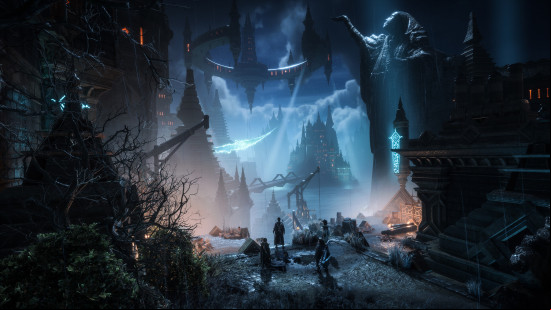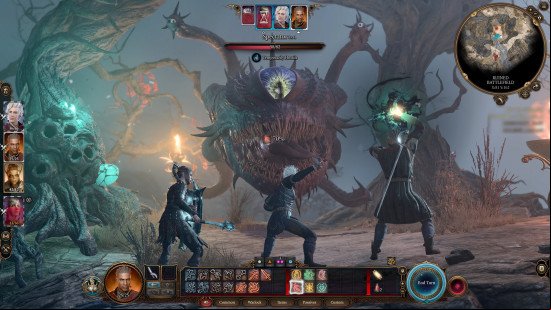Dragon Age: The Veilguard left me conflicted. On one hand, seeing Thedas brought to life so beautifully, and finally getting to visit regions I'd only heard about in lore snippets and storybooks, was a dream come true. On the other hand, its narrative – what, for me, made the series so special – felt weaker than its predecessors', and the action-driven combat never quite gelled. Yet it worked for many others, earning largely solid reviews that weren't far off the now-lauded Dragon Age 2. But there's been an air of sadness or finality over the game since its launch, with no expansions on the horizon – a first for the series.
Speaking to former Dragon Age lead writer David Gaider, who's credited with the creation of Thedas, there's a similar sense of melancholy. Ahead of the launch of his new RPG "complicated." He tells me that he still hasn't touched it, saying that his deep-rooted connections to Thedas make it "hard" to go back.

When I ask about the series' transition over the years from a strategy-heavy RPG to a fast-paced, mission-based action game, then to a quasi-MMORPG, then, of course, to Veilguard, he says that "Dragon Age is like the Alien franchise of games: every Alien movie is almost a different genre and a completely different reboot of style, and I think Dragon Age, in many ways, is the same.
"For the first three titles, I was there, and I understood the reasons behind all the changes – each time it was sort of an overcorrection for what we thought the problems were with the previous title, then it combined with various issues at the time that were specific within Bioware. Dragon Age 2 was the size it was because we had to fill a production slot before the fiscal year and because Star Wars: The Old Republic was sucking up so much cash from everything. Then, Inquisition was kind of a reaction to the fact that some fans were quite disappointed by Dragon Age 2 – although, as an aside, in many ways I think it's one of the best titles in the series – but, regardless, we felt like we had something to answer for. I think, in many ways, Inquisition kind of yet again moved the barometer too far in that direction.
"So I kind of see Veilguard [as] more of that – it was answering what came before and kind of moving the barometer a bit too far in many ways, but it also had a lot of internal trouble within Bioware as well; they were at the merciless ends of it, from what I understand anyway." He clarifies that "I'm an outsider now, so I only know part of it.
"I still haven't played [Veilguard] because it's hard to see. I had a very personal relationship with Dragon Age and I chose to leave it, so I'm not blaming anyone or anything, but to see it sort of continue on without me and make different choices, there's always that element in your head that's like 'is that what I would've done? Would it have been different if I'd stayed and been there and helmed the writing of it?' Who knows, but it is still very, very difficult to see."

As a longtime Dragon Age fan, Veilguard almost feels like it closes the book on Thedas. EA has stated that the game performed "nearly 50% worse" than expected, though whether those expectations were realistic is up for debate.
Back in February, Gaider encouraged EA to "follow Larian's lead," a comment that quickly went viral. I ask what he meant by that. "In many ways, Dragon Age was, I think, not a good match for EA," he tells me. "They never really knew what to make of it, or what to do with it. The expectation was always that it wouldn't do well, and when it did do well, it took people by surprise. By comparison, Mass Effect was slick and it was action-driven and very much up EA's alley, so they always expected that it should do better, and every time it didn't, it got excuses like 'oh they released in the wrong timeframe, or X, Y, and Z.' The idea was that the potential for Mass Effect was more – it could get the action audience as well as the RPG audience. It wasn't until Mass Effect 3 that they started to realize that 'no, there's an action RPG audience, like a crossover,' but you don't just get both audiences together.
"Even though Dragon Age only catered to the RPG audience – at least initially – [EA] kept wanting it to move into the action space as well – and maybe by Veilguard it has. I think their idea was that the 'cap' on the RPG audience was only so big," he recalls. "Then Baldur's Gate 3 comes along and proves no, it's possible that if you lean into what a genre does really well, you can grow the audience, as it turns out."

"It's funny, trying to turn Dragon Age into something it's not. Wouldn't it have been great if they could have had the vision that Larian had and looked at what that type of game does really well and just doubled down on it? Double down on the choice-driven narrative, double down on the production value, like the presentation of the characters and the cinematics and dialogs, and just take it to the extent where quality is the watchword.
"What Larian did was exceptional and hard to replicate because they don't have a publisher over them; they're privately owned so you can't just translate that to anyone else, but it'd be like asking a publisher like EA to have the vision that Larian did, and they really live on two different planets."
